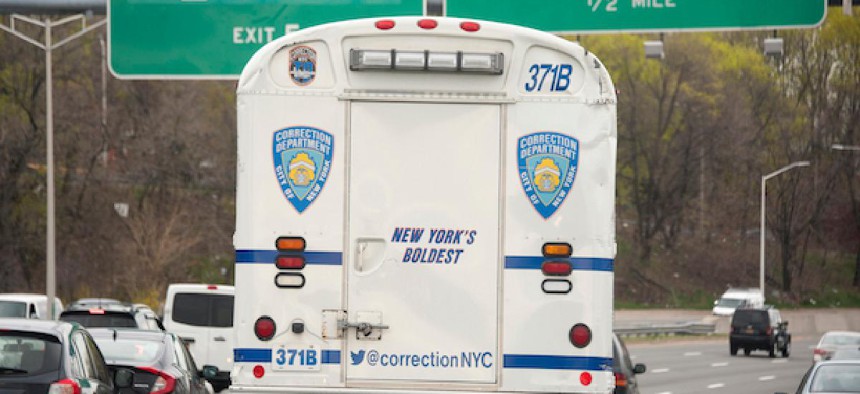Hochul orders the relocation of over 200 incarcerated people
In an attempt to ease overcrowding at the Rikers Island jail complex amid its ongoing crisis, incarcerated women and trans-identified people are being transferred to state-run facilities.

A New York City Corrections bus. SkunkChunk/Shutterstock
On Wednesday, Gov. Kathy Hochul and New York City Mayor Bill de Blasio announced a plan to relocate about 230 women and trans-identified people, who are currently incarcerated at the Rikers Island jail complex, to two state-run facilities in an attempt to deal with the jail system’s ongoing crisis.
"I am especially heartened that the state is able to assist some of the most vulnerable populations on Rikers, and today, I am proud to announce the state's agreement with the city to temporarily move the majority of these populations off Rikers and into safer state facilities, and I thank the city for its partnership on this important step,” Gov. Hochul said.
The move has already been met with resistance, with the Legal Aid Society admonishing the latest step to alleviate the crisis on Rikers because it would affect incarcerated people’s access to a fair trial.
“This decision will create new harms for these women, disrupting their access to due process, their children, families and support networks,” Tina Luongo, an attorney in charge of Legal Aid’s Criminal Defense Practice, said in a press release. “This move is rushed, ill-conceived and will surely inflict further trauma on our clients. We again demand decarceration, and are considering litigation should Gov. Hochul and Mayor de Blasio proceed with these transfers.”
Tiffany Cabán, a public defender and the Democratic candidate for the City Council’s 22nd District, told City & State that the decision is unwise. She said it would further separate incarcerated people from their families, some of whom would have to take time off to be able to visit the facilities, which would lead to several logistical issues.
“If the reasoning behind this is to get people off of Rikers Island because Rikers is so dangerous and so deadly and there is no way to keep folks safe – logistically speaking the way that it works is if you have a client who is incarcerated in an upstate facility and they have a New York City Court date, those buses only come a certain number of times a week, so you have that person traveling depending on what the schedule is down back to Rikers,” Cabán said. “(They’re) being housed on Rikers for up to a number of days before their court date and then after that they’re still there until the next bus comes to take them back upstate. So you're still effectively going to be exposing them to Rikers Island.”
Cabán also said that the root issues still have yet to be addressed, such as those who are incarcerated because they can’t afford to pay for bail.
“It's about 230 folks (that are being relocated) and I think over 220 of them are being incarcerated pretrial, meaning that they have been found guilty of nothing and they're just too poor to buy their constitutional rights or the presumption of innocence,” Cabán said. “And if they had the money, they would be out again, so this has nothing to do with public safety. We're looking at a handful of people who are city-sentenced when the mayor could be using his executive authority to release them and should.”
NEXT STORY: The Rikers Island crisis, explained
